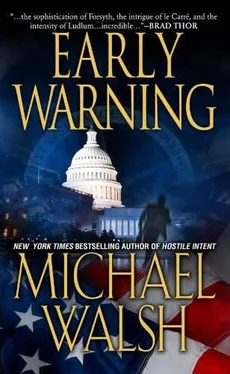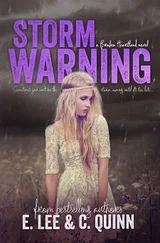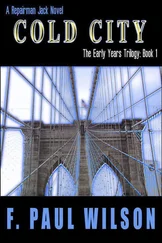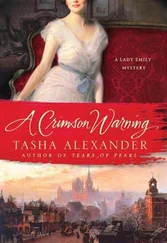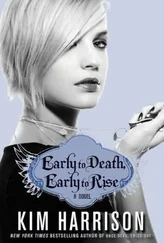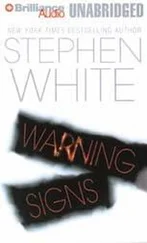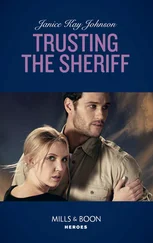Michael Walsh - Early Warning
Здесь есть возможность читать онлайн «Michael Walsh - Early Warning» весь текст электронной книги совершенно бесплатно (целиком полную версию без сокращений). В некоторых случаях можно слушать аудио, скачать через торрент в формате fb2 и присутствует краткое содержание. Жанр: Триллер, на английском языке. Описание произведения, (предисловие) а так же отзывы посетителей доступны на портале библиотеки ЛибКат.
- Название:Early Warning
- Автор:
- Жанр:
- Год:неизвестен
- ISBN:нет данных
- Рейтинг книги:3 / 5. Голосов: 1
-
Избранное:Добавить в избранное
- Отзывы:
-
Ваша оценка:
- 60
- 1
- 2
- 3
- 4
- 5
Early Warning: краткое содержание, описание и аннотация
Предлагаем к чтению аннотацию, описание, краткое содержание или предисловие (зависит от того, что написал сам автор книги «Early Warning»). Если вы не нашли необходимую информацию о книге — напишите в комментариях, мы постараемся отыскать её.
Early Warning — читать онлайн бесплатно полную книгу (весь текст) целиком
Ниже представлен текст книги, разбитый по страницам. Система сохранения места последней прочитанной страницы, позволяет с удобством читать онлайн бесплатно книгу «Early Warning», без необходимости каждый раз заново искать на чём Вы остановились. Поставьте закладку, и сможете в любой момент перейти на страницу, на которой закончили чтение.
Интервал:
Закладка:
Still holding her in his arms, Sinclair maneuvered her as far away from the flatscreen as he could. “You know I will,” he whispered. “When have I ever lied to you?” From this angle, he could just manage to reach out and hit the computer, shutting off the video feed to the other twelve televisions in the house.
They had moved toward the French doors, which led out to the patio. Sinclair spent most of his life indoors, in a car, or on an airplane; the fresh air felt good.
“You can do it, Jake,” Jenny said. “You can get them, those bastards.” Somewhere, on somebody’s TV, Manhattan was still under attack, but that was not what Jenny meant. “You can get them, hold their feet to the fire, make them live up to our American ideals.”
The relaxation of monopoly rules under a succession of presidents and congresses had given men like him an opportunity. Most Americans never thought at all about where their information was coming from, how it was filtered, interpreted, refashioned, and corrupted until it landed on their computer screens, BlackBerrys, iPhones or, diminishingly, in newspapers. Sinclair’s genius was that he owned them all. In fact, some of them he had purchased from a man named Emanuel Skorzeny, a well-known financier who had mysteriously gone missing the year before after selling off many of his media assets at fire-sale prices.
“Get in the game, Jake,” Jenny was saying. “Use your empire. Take that bastard Tyler down.”
Jenny II or no Jenny II, he had just about had it with the party in power. The man had been elected on an “anti-” platform. Anti-everything that had come before, most especially his predecessor, whose invincible ignorance and smug moral certainty had enraged every almost segment of society except Flyover Country. And yet, something had caused Tyler to turn away from Blame America First. Once in office, he had disappointed many of his supporters and enraged others by refusing to move his social reforms along as quickly as he had promised, and they had hoped. Some devil had snuck into the White House in the dead of night and climbed under the covers with the Bachelor President. Sinclair wondered who it had been.
There were plenty of stories about Tyler on hold. Stories in the newspapers, the magazines, stories ready for broadcast, awaiting just the pushing of the “publish” buttons on the net. But progressives weren’t supposed to attack their own, certainly not the matter of sexuality, or even of speculative sexuality, and certainly not when they were supposed to take the side of the “anti-” party, whatever its current positions were. It was unseemly to attack any member of the party, any potential ally, any useful idiot, which Tyler had always been. But now, with New York aflame, it was time to take the gloves off.
Gently, he released Jenny II. Thoughts of divorcing her had fled his mind; his field of vision had room only for the devastated heart of midtown Manhattan and her father’s bank account, most of it still unplundered, ripe for the taking. “I’ll get the bastard,” he told Jenny II. “You can count on me.”
As they moved toward the pool, he unfastened the halter top of her simple shift, which dropped to the ground. As he stroked her bare back, he guided her toward the spa.
She slipped into the water like a sleek mermaid. It was amazing how much better, how much sexier, naked women were in the water, so smooth, so unencumbered, their skins glistening as they cut through the water like seals. It was their natural element.
He sloughed off his shirt and slid out of his trousers. One thing left to do.
He punched a single key on his Surge, the one that connected him directly to the newsroom of his flagship paper in Manhattan. He was getting ready for another round of down-sizing, but they didn’t have to know that now. All they had to think about at the moment was the Pulitzers they were going to win. Might as well live it up.
“Endorse Hassett. Yes, tomorrow morning. No, I don’t care how this ends, it’s not going to change my mind. You have my standing editorial. Set the agenda. Do some damage. It’s the American way.”
He turned to Jenny II, so seductive. His hand brushed the button for the spa. The bubbles leapt to life. So did he.
By God, he still had it. He still had it.
CHAPTER SEVENTEEN
Manhattan
In his heart, nearly bursting from the exertion of his sprint, Frankie Byrne had always known he would be too late, but he didn’t know what else to do. “First through the door” was the motto of New York ’s Finest, Irishmen to the core no matter what their ethnicity. He had lived by this motto for his entire career on the force, and he was not about to give it up now. Not even when the danger was greatest, which made the urgency all the more fierce. First through the door meant first through the door, whether the door was real or figurative, whether a shithole in the Bronx or a Park Avenue apartment, whether the door opened onto a swanky restaurant, an East Village head shop, a Queens crack house, or the Archbishop’s fuckpad across from MoMA. It was all the same to him. You went in to sort the situation out, or you died in the attempt. There was no sense rationalizing it. You just did it, and if the devil got you, well, you hoped you’d be in heaven long before the cocksucker knew you were dead. That was the Paddy way, and it was the only way he knew.
Why this was true was a mystery, but it was departmental lore and so every cop on the force abided by it. For Byrne, however, it went deeper. His father had died in the line of duty. In a firefight, you shot first or you died, and Robert Byrne had had been shot in the back, and even though he managed to turn on his unknown assailant he had not fired his weapon, out of fear of hitting a civilian. And so he died. Byrne honored his father’s memory, but he had no intention of ever letting that happen to him.
The explosion at the AMC movie theater practically hit him in the face. Luckily, he had not yet rounded the corner, or else he would have been instantly as dead as all the other pedestrians in the vicinity, from the Port Authority to the Great White Way. Instinctively, he fell to the pavement, rolling as close to a nearby building as he could manage, waiting for the shitstorm to stop.
He had never been this close to a general disaster-personal disasters had been enough for him-but he found himself strangely calm in the midst of it. In all his other encounters with the forces of evil, he had been a lone man, facing another lone man, both of them holding a sidearm. The romance of the movies was that men fired at each other from great distances with pistols, but Byrne knew from bitter personal experience that in urban confrontations your opponent was usually standing right in front of you, so it was not a matter of marksmanship but alacrity. Despite the caterwauling from the sissies and the nancy boys on the city council and the Civilian Complaint Review Board, an officer’s first job was to go home safe every night.
Even as an NYPD officer, Byrne had never experienced anything like this: a rain of fire, of molten brick and steel and plastic. When he was finally able to peek around the corner, a stunning sight met his eyes: shredded bodies, some of them headless, many of them limbless, all of them dead.
Despite the increasingly militarized nature of urban police forces, cops weren’t supposed to be soldiers. They kept the peace up close and personal, not from a marksman’s dispassionate remove. They fought one-on-one, like the street fighters they had once been, battling the thugs, grifters, and second-story men their forebears knew so well. In the old days, back when Byrne’s grandparents had come over from Ireland and settled first on the Lower East Side and later in Queens, you grew up with the criminals you would eventually put in jail. Today, they came from thousands of miles away, disembarking at Kennedy Airport, their support staff already in place along Atlantic Avenue in Brooklyn, just waiting for a signal, whether from their controllers or Allah.
Читать дальшеИнтервал:
Закладка:
Похожие книги на «Early Warning»
Представляем Вашему вниманию похожие книги на «Early Warning» списком для выбора. Мы отобрали схожую по названию и смыслу литературу в надежде предоставить читателям больше вариантов отыскать новые, интересные, ещё непрочитанные произведения.
Обсуждение, отзывы о книге «Early Warning» и просто собственные мнения читателей. Оставьте ваши комментарии, напишите, что Вы думаете о произведении, его смысле или главных героях. Укажите что конкретно понравилось, а что нет, и почему Вы так считаете.
